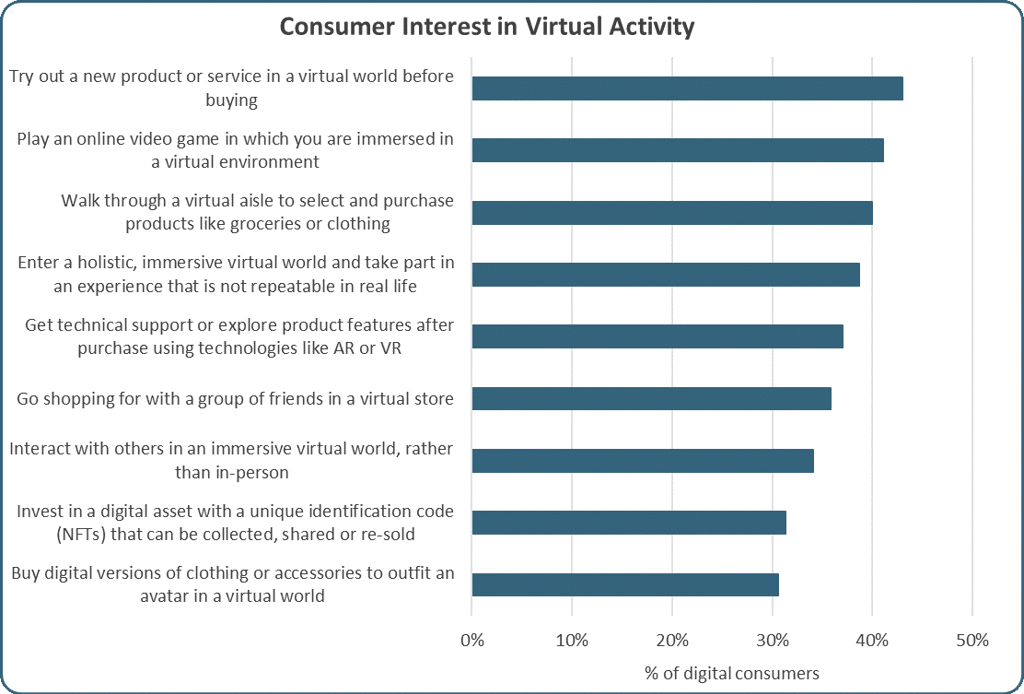This article was originally published on Forbes.
The metaverse has taken 2022 by storm. This futuristic world is the latest buzzword in business. But is it living up to the hype?
Why the metaverse keeps making headlines
Everyone relied on video calls and the online channel during COVID-19. Brands moved to digital platforms to connect with consumers. This period led to a boost in AR and VR usage to virtually try out products, according to Euromonitor International’s Voice of the Consumer: Digital Survey.
In some ways, the metaverse is an extension of the virtual, augmented and mixed reality technologies in use today.
The metaverse, though, is more complex. It combines the aforementioned technologies with social media, livestreaming, cryptocurrencies and gaming platforms to create a more advanced virtual world where consumers outfit their avatars and explore.
The promise of this better connected, shared, holistic 3D space could further transform brand experiences and take online shopping to the next level.
Advanced technologies in the metaverse could add dimension to the online experience, including more accurately recreating the interactions and emotions associated with an in-person experience.
In fact, digital consumers are most interested in using virtual technologies for that very reason. However, newer applications of such tech such as purchasing NFTs are still nascent.

Source: Euromonitor International Voice of the Consumer: Digital Survey 2022
Cashing in on this 3D world
Companies are starting to pay closer attention to the metaverse.
The concept became part of everyday discourse when Facebook announced massive investments to build a metaverse during a mid-year earnings call in 2021. Soon thereafter, the social media conglomerate rebranded to Meta.
Almost simultaneously, other tech giants such as Microsoft and Epic Games announced million-dollar investments in this burgeoning universe. Consumer goods companies, ranging from Nike to Coca-Cola to Gucci to Procter & Gamble, are now racing to stake their claim in this emerging realm.
Many brands are focused on building equity among the metaverse pioneers, but activity is shifting toward commerce. Interest in digital assets and cryptocurrencies spiked in 2021. Burberry partnered with Mythical Games for an NFT collection in Mythical’s flagship game, while Coca-Cola auctioned its first NFT collectibles last year.
Beauty and fashion companies have been the biggest players in the metaverse so far. These products—make-up, apparel, accessories and beyond—are natural fits for this digital environment as advanced technologies enhance the virtual try-on experience.
Moving forward, several brands plan to expand digital retailing efforts, but approaches differ widely, from maintenance to significant expansion. While 2022 will be for the frontrunners, all brands will likely need a metaverse strategy within a few years.
Making moves in the metaverse
Brands will have to embrace the metaverse to reach up-and-coming shoppers such as Generation Z who are shunning traditional mediums in favour of gaming or social platforms. In fact, these consumers—who use online games and video-first social media for streaming and socialising—are laying the groundwork for the shift toward metaverse platforms.
Innovative companies should continue to integrate AR/VR technologies into their commerce strategies.
First, focus on brand engagement. Then, pursue and invest in more complex use cases such as replicating a physical experience online or creating a virtual showroom. These applications will serve as a natural precursor to more dynamic touchpoints.
Once these technologies become more mainstream, consumers will likely demand such experiences. However, to make an impact, retailers and brands need to engage consumers across these platforms in a meaningful and authentic way.
